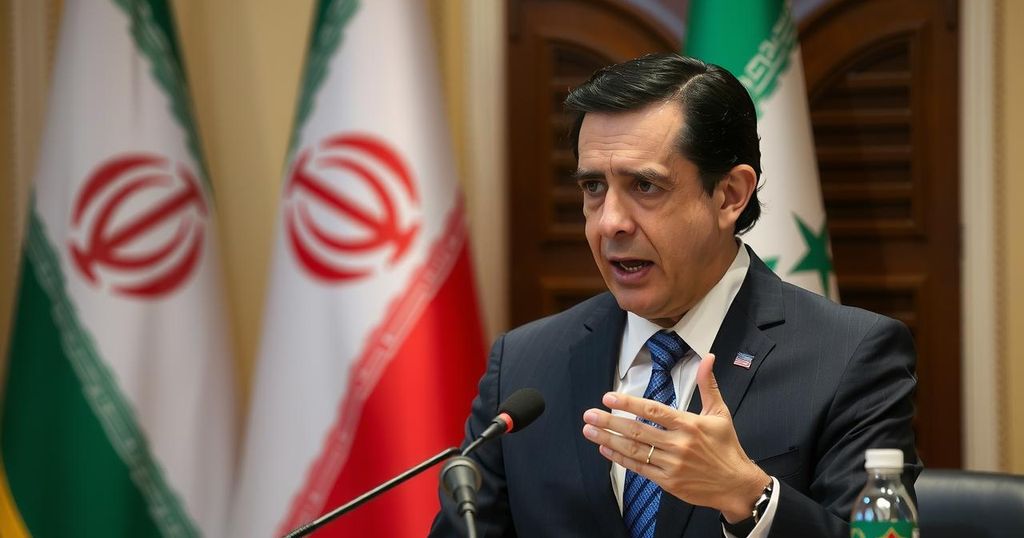Global news
ABBAS ARAGHCHI, AL - QAIDA, ARAGHCHI, ASIA, ASSAD, AXIS OF RESISTANCE, BASHA, BASHAR AL - ASSAD, CONFLICT, DIPLOMACY, EUROPE/ASIA, FIGHTER JETS, HAYAT TAHRIR AL - SHAM, IRAN, MIDDLE EAST, OF RESISTANCE, QATAR, REUTERS, SYRIA, SYRIAN CIVIL WAR, SYRIAN CONFLICT, TURKEY, U. S
Marcus Li
0 Comments
Assad Alleges Turkey’s Support for Rebels Amidst His Downfall in Syria
In the days prior to his removal, Bashar al-Assad expressed grievances to Iranian officials regarding Turkey’s support for Sunni HTS rebels attempting to topple his regime. The ensuing meetings between Iranian and Turkish foreign ministers highlighted tensions regarding ongoing military support and regional strategies, culminating in Assad’s eventual flight to Moscow and the implications for Iranian influence in the Middle East.
In the final hours leading to his ouster, Syrian President Bashar al-Assad expressed concerns to Iranian Foreign Minister Abbas Araghchi regarding Turkey’s support for Sunni rebel factions, specifically Hayat Tahrir al-Sham (HTS), aimed at his removal. This meeting occurred on December 2 in Damascus, coinciding with significant territorial gains made by HTS. Iranian officials noted that during this discussion, Assad articulated his displeasure over Turkey’s actions, prompting assurances of unwavering support from Iran’s leadership. Following this, Araghchi conveyed Iran’s apprehensions directly to Turkish Foreign Minister Hakan Fidan. This encounter reportedly featured a tense exchange, with Iran criticizing Turkey’s alignment with United States and Israeli interests regarding Syria, while Fidan pointed to Assad’s failure to engage in constructive dialogue as a catalyst for ongoing unrest.
The subsequent ouster of Assad marks a pivotal shift in regional power dynamics, impacting the influence of Iran and its ally, Hezbollah, substantially. For Iran, its support of Assad had been instrumental in establishing a strategic corridor for its operations extending from Tehran through Iraq to Lebanon. Following their lengthy expenditure of resources and military support to sustain Assad’s regime, his downfall signifies a significant loss for Iranian geopolitical ambitions in the region. Iranian Supreme Leader Ayatollah Ali Khamenei attributed the fall of Assad to a concerted plan devised by both the United States and Israel, implicating regional neighbors, presumably Turkey, in these machinations. Overall, the evolution of these events underscores the complexities and the intertwining interests in the Syrian conflict that have now reached a decisive turn.
The Syrian civil war, igniting in 2011, has been characterized by the clashing interests of various regional and global powers. President Bashar al-Assad’s administration has been backed predominantly by Iran and its aligned groups, including Hezbollah, which considered Assad a crucial ally. Conversely, Turkey has supported various opposition factions, including Sunni rebel groups, escalating the conflict. This situation reflects ongoing geopolitical contests involving Iran’s influence in Syria, regarded as a vital part of its strategy to challenge U.S. and Israeli power in the region. The recent closely contested dynamic culminates with Assad’s departure to Moscow after decades of leadership by his family, marking a significant turning point in both Syrian politics and regional power structures.
In conclusion, the recent events leading to President Bashar al-Assad’s ousting highlight the hyper-complex nature of international relations within the Syrian conflict framework. Iran’s persistent backing in the face of Turkish opposition underscores the fragile alliances and the shifting nature of support amidst warfare. Assad’s departure not only signifies a loss for Iran and Hezbollah but also invites further scrutiny into the broader regional implications of these developments, including the potential rise of new power dynamics involving Turkey’s role and influence in Syria.
Original Source: www.voanews.com




Post Comment